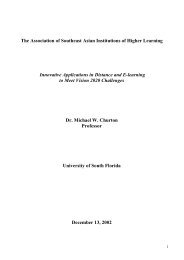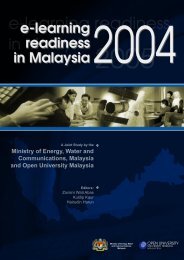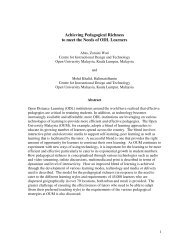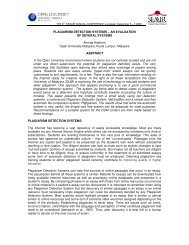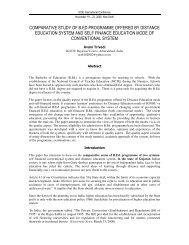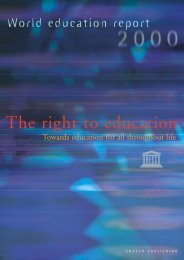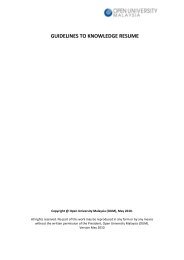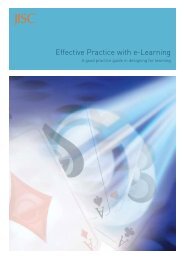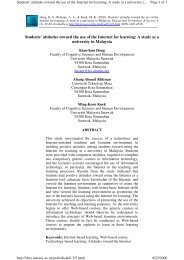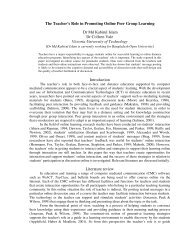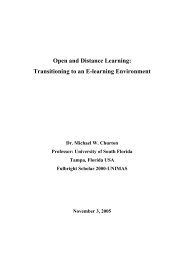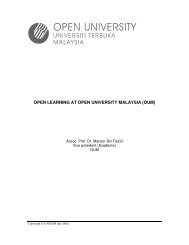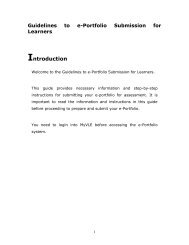The only face-to-face tuition for the course is a day school which is scheduled severalweeks after the start of the course, <strong>and</strong> after students have ‘met’ each other online,through their AOSIS role play in groups moderated by their tutor. Tutors nevertheless feelthat they can often support students more effectively than previously, through being intouch week by week, <strong>and</strong> able to contact individuals very easily by means of e-mail.While there is much praise from both students <strong>and</strong> tutors for this course <strong>and</strong> its approach,not all students are equally enthusiastic. Many find it time consuming. In spite of theextensive guidance provided, <strong>and</strong> the graded introduction to Internet searching, studentsstill find that it takes them longer than they expect to find exactly what they are lookingfor. Also the course, as with many others that build in conferencing to achievement of<strong>learning</strong> outcomes, requires students to participate at particular points in time. The muchacclaimed flexibility of ‘traditional’ <strong>distance</strong> teaching is reduced by this approach, asearlier studies have shown (Thorpe, 1998). On one h<strong>and</strong>, the <strong>learning</strong> advantages ofparticipating in online debates <strong>and</strong> consensus reaching are achieved, while on the other,students (some at least) find it difficult to commit themselves to participate during thewindow of time when such activities are scheduled. While dialogue is asynchronous,the activity overall has to be time limited, <strong>and</strong> some students find that work <strong>and</strong> otherpressures make it difficult to find time during those specific weeks. If they miss it, theycannot catch it up later, <strong>and</strong> may even have to lose marks since participation is builtinto the assignment <strong>and</strong> a proportion of marks awarded for taking part effectively. Thisstrategy has the positive benefit of rewarding students for an activity that develops theirskills <strong>and</strong> underst<strong>and</strong>ing of the issues of environmental science, <strong>and</strong> the disadvantages areof course unintended effects which impact on some students more than others.CULTURAL EXPECTATIONS AND PREFERENCESUse of the Internet has enabled institutions to register learners wherever they are based.However, technical accessibility may reveal more subtle cultural barriers againstparticipation. When the Open University sought to open its courses to US students, it hadto break down long courses into shorter modules, fitting with the US semester system,<strong>and</strong> also with the concept of regular instructional activity led by a tutor, on a weeklybasis. Course materials may also include content that is too culturally specific, or evenoffensive in some contexts. Yet here technology may help with the challenge. Digitallystored course materials can be edited, inappropriate sections cut <strong>and</strong> new material addedto suit the new context. This process is facilitated by the use of content managementsystems <strong>and</strong> course designs based on reusable <strong>learning</strong> objects. While definitions ofa <strong>learning</strong> object vary (Mackintosh et al, 2005), the core idea is to construct materialwhich is organised into defined chunks which make sense in their own right. Chunkscan be selected <strong>and</strong> used again in new combinations with new material <strong>and</strong> connectingstrategies. This requires course teams to rethink how best to provide an integratedexperience for learners, <strong>and</strong> detailed negotiations may also be necessary to ensure thatdiverse cultural expectations can be accommodated (Thorpe et al, 2003).However, even where national boundaries are not in play, learner preferences can havea negative impact. Business students, for example, have often been unenthusiastic aboutcomputer conferencing. Their feedback emphasises that they study with strong vocationalgoals in mind, <strong>and</strong> in some cases, do not want to study via a computer screen having beenat work all day, using a computer. They <strong>and</strong> other students are also experienced in fittingstudy around other tasks, at times <strong>and</strong> places where access to a computer is not feasible –while commuting for instance. Courses which absolutely have to be done at the computerscreen, are thus reintroducing a potential barrier for these students – until such time asmobile technology produces a solution even for this challenge.27
NEW AREAS FOR DISTANCE EDUCATION:WORK-RELATED LEARNINGThe OU is now seeing the development of new capabilities in what it can do, arising fromuse of digital media. Whereas the list of potential advantages can be envisaged as makingmore effective the existing model of <strong>distance</strong> teaching – or supported open <strong>learning</strong> as theOU prefers to call its model – we are now seeing radically new kinds of teaching emerge,particularly in work-related <strong>learning</strong> <strong>and</strong> skills development.While OU students have always studied for a mixture of motives, including relevance ofstudy to the student’s job or career aspirations, since the 1990s, qualifications linked withprofessional accreditation <strong>and</strong> on-the-job development have been offered. These havebeen very much enabled by the feasibility of using computer mediated communication.Leach, for example, describes two programmes that developed very effective online<strong>learning</strong> communities for teachers involved in rather different work-related <strong>learning</strong>(Leach, 2002). The first was a pre-service teacher <strong>education</strong> programme leading to theaward of a graduate teacher qualification, the Post Graduate Certificate of Education.The second was a continuing professional development programme for serving teachers<strong>and</strong> librarians, aimed at use of ICT for subject teaching, from primary through secondarylevels. Participants on the second, The Learning Schools Programme (www.lsp.open.asc.uk) developed an action plan for their use of ICT in their chosen subject, <strong>and</strong> workedthrough self-assessment for the award of a certificate of completion.Although both these programmes were different in terms of target audience, goals<strong>and</strong> mode of assessment, they used conferencing in similar ways, to provide an onlinesupport community, to stimulate discussion of resources provided elsewhere <strong>and</strong> to makelinks between the existing professional world of schools <strong>and</strong> <strong>education</strong>, <strong>and</strong> students’professional colleagues <strong>and</strong> community online. Such goals are now quite common inonline study programmes, but the high usage <strong>and</strong> traffic levels of both programmes areevidence that very lively online discussions were achieved. During its first three years(2000-2003), the Learning Schools Programme achieved monthly traffic of around10,000 users, with over 100,000 school professionals involved, crossing both sectors <strong>and</strong>all subjects.While such developments are not entirely the product of ICT, enhanced communications<strong>and</strong> the immediacy <strong>and</strong> resource-rich features of Internet usage, enable the Universityto teach <strong>and</strong> assess professional skills, where dialogue between students <strong>and</strong> experts isparticularly important <strong>and</strong> up-to-date content relevant to the cultural context is vital. TheOU has developed a national reputation for its teacher training, <strong>and</strong> demonstrated that itoffers some advantages even over campus-based approaches. Students share experiencesduring their study of the theory of their profession, <strong>and</strong> can bring theory <strong>and</strong> practicetogether in ways that start to break down the unhelpful divide between the two.Most students have to learn how to use communication software <strong>and</strong> in the case of theOU, FirstClass has been the software most often used, not least because of its ability tosupport such large-scale usage. We now have over 200,000 students annually loggingonto our systems <strong>and</strong> using them for all forms of study <strong>and</strong> assessment. In order to passtheir course, most students therefore develop their ICT skills. However, explicit teachingin how to use the Internet is a m<strong>and</strong>atory element in most degree programmes, <strong>and</strong> somecourses have achieved great success in this area.28
- Page 1 and 2: PERSPECTIVES ONDISTANCE EDUCATIONLi
- Page 3 and 4: The Commonwealth of Learning (COL)
- Page 5 and 6: ACKNOWLEDGEMENTSIn addition to the
- Page 7 and 8: These are some of the issues that a
- Page 9 and 10: What are the trends and issues in l
- Page 11 and 12: of policy implications relating to
- Page 13 and 14: evince important differences that c
- Page 15 and 16: inequitable regulations governing t
- Page 17 and 18: associations and groups of countrie
- Page 19 and 20: THE CONTRIBUTORChristopher McIntosh
- Page 21 and 22: INTRODUCTIONIn his 1996 report to U
- Page 23 and 24: Lastly, our analysis of the situati
- Page 25 and 26: diploma or similar certificates of
- Page 27 and 28: force of the undertaking. Here agai
- Page 29 and 30: RELEVANT INTERNET SITESUNESCO Task
- Page 31 and 32: Notes1. This phrasing has been used
- Page 33 and 34: goals (Daniel, 1996). Lifelong lear
- Page 35: eported that group activity had red
- Page 39 and 40: targets systematically for the use
- Page 41 and 42: Rausch, A.S. (2003). A case study o
- Page 43 and 44: correspondence teaching systems tha
- Page 45 and 46: significant differences between syn
- Page 47 and 48: In distance flexible- and blended-e
- Page 49 and 50: STATE-FUNDED DUAL-MODE SYSTEMS ATUN
- Page 51 and 52: Table 4.2: Fundable elements in dis
- Page 53 and 54: sciences in 21 countries of the reg
- Page 55 and 56: How a system is funded depends in p
- Page 57 and 58: Litto, Fredric M. (2004). Digital l
- Page 59 and 60: CHAPTER 5LIFELONG LEARNING IN THE A
- Page 61 and 62: education, which was initiated by C
- Page 63 and 64: So the virtual classroom acted as a
- Page 65 and 66: In June 2002, when the course came
- Page 67 and 68: RELEVANT INTERNET SITESFORCIIR proj
- Page 69 and 70: 11. The approximate rate for 1€ w
- Page 71 and 72: The term modern distance education
- Page 73 and 74: the National Networked Consortium f
- Page 75 and 76: important resource for undeveloped
- Page 77 and 78: standards have been proposed for th
- Page 79 and 80: The development of e-learning withi
- Page 81 and 82: RELEVANT INTERNET SITESCCRTVU Onlin
- Page 83 and 84: MoE (2004b) The Notice on Running N
- Page 85 and 86: CHAPTER 7QUALITY ASSURANCE SURVEYOF
- Page 87 and 88:
(Paris, France, 28-29 June 2004) in
- Page 89 and 90:
Examples of elaborated QA policies:
- Page 91 and 92:
plans and produces its conventional
- Page 93 and 94:
SHTVU (China)• Teaching• Teachi
- Page 95 and 96:
offers its programmes to Turkish ci
- Page 97 and 98:
mega universities apply a set of st
- Page 99 and 100:
RELEVANT INTERNET SITESThe Commonwe
- Page 101 and 102:
2. QA initiatives or publications b
- Page 103 and 104:
assurance of ODL. This DST will be
- Page 105 and 106:
Educational Planning has been respo
- Page 107 and 108:
A system of weighting of the key qu
- Page 109 and 110:
RELEVANT INTERNET SITESHigher Educa
- Page 111 and 112:
CHAPTER 9THE FINNISH VIRTUAL UNIVER
- Page 113 and 114:
foreign providers. In Finland, the
- Page 115 and 116:
to make the best use of new educati
- Page 117 and 118:
The foremost task for the Service U
- Page 119 and 120:
part of quality management. The aim
- Page 121 and 122:
online courses; an educational tech
- Page 123 and 124:
polytechnics, research institutions
- Page 125 and 126:
CHAPTER 10PROMOTING CROSS-BORDERREC
- Page 127 and 128:
The Bologna Declaration was followe
- Page 129 and 130:
indicators currently being used for
- Page 131 and 132:
the qualification resulting from th
- Page 133 and 134:
Table 9.1: Outline of the portfolio
- Page 135 and 136:
• Make sure that incoming student
- Page 137 and 138:
CHAPTER 11CHARTING THE EVOLUTIONOF
- Page 139 and 140:
Another common characteristic was t
- Page 141 and 142:
the current capacity of the educati
- Page 143 and 144:
conditions for success. Conditions
- Page 145 and 146:
Cultural and ethical issues in inte
- Page 147 and 148:
the cost and maintenance of learnin
- Page 149 and 150:
Research can be a useful tool for c
- Page 151 and 152:
REFERENCESBates, A. (1995). Technol
- Page 153 and 154:
Twigg, C. (2001). Quality Assurance
- Page 155 and 156:
y, for example, entering into partn
- Page 157 and 158:
and even greater steps, and the dec



